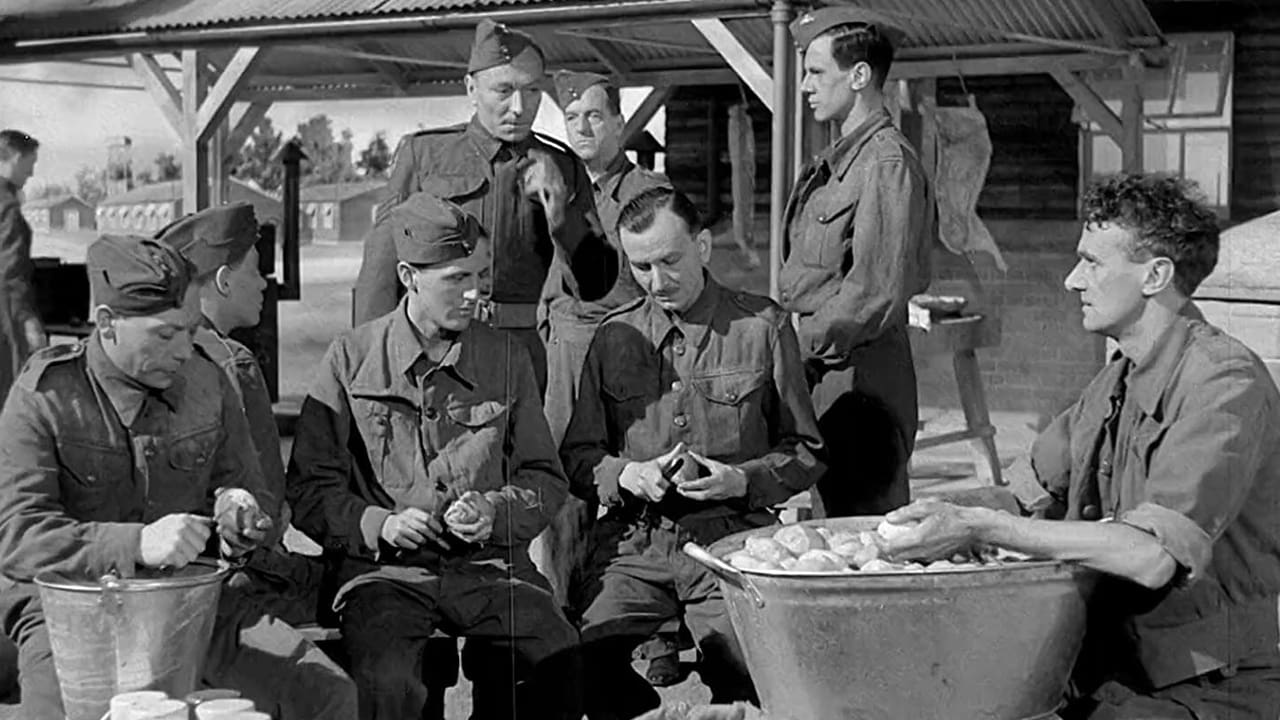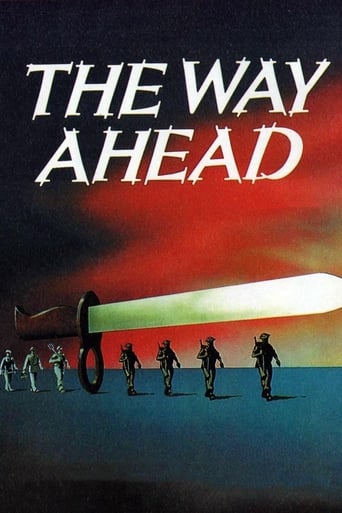

There's a very long setup in The Way Ahead, and while I understand that it's necessary, I wish I had known about it beforehand. This is a pretty heavy war drama, and the first half of the film is spent getting to know the characters of the soldiers, establishing the relationship between the regiment and their commanding officer, and their training to prepare for battle. Those three elements are very important to the story, and perhaps given this warning you'll have more patience with the film than I did. I thought it was going to be a battlefield movie; I'm sure I'll appreciate the film much more the second time around.David Niven plays the commanding lieutenant, and for the first half of the film, he continually clashes with his troops. They badmouth him, refuse to cooperate, and begrudge his trying to get them into shape and ready for WW2. There's a very touching scene when they finally realize Niven is just as human as they are, and from that point on, they all get along. What conflict is left to further the second half of the film, if everyone likes each other? World War Two!This turns out to be a pretty tense war drama, and the very applicable title will make more sense to you after you watch it. My advice is to be prepared for an emotional investment that may or may not pay off in the long haul. It'll take a while, but you'll get immersed in the characters and their world, and when the movie's over you'll probably feel drained. WWII lovers are going to want to add this one to their lists.
... View MoreThis is a film about a seemingly run of the mill sort of group. After the Brits were involved in WWII and saw how bad the going would be, the government was forced to draft men who would traditionally have been exempt. Men who were a bit old or involved with careers that might be deemed 'useful' to the effort were suddenly being called to duty, as times were dire. The beginning of the film shows these men being selected for service.Unfortunately, this is a rather motley group and they tended to complain quite a bit as well (mostly by Stanley Holloway's character). How they could become a productive unit seemed pretty doubtful and I doubt if such an unimpressive group of men would have been used as actors had this propaganda film been made a few years earlier--when things looked really bad for the British. However, now that the war was appearing win-able, I can understand the choices of actors.There is nothing particularly magical about any of the film--their selection, their training or their combat experience in North Africa. However, all of it was very well handled and excelled because they tried to make it believable--normal, everyday men rising to the occasion. In many ways, it reminded me of a landlocked version of "In Which We Serve"--with fine acting and writing instead of jingoism and super-human exploits. Very well done.There are a few interesting actors in the film. Peter Ustinov is in his first film and he plays a French-speaking man. While his French isn't 100% fluid, it was decent and a bit of a surprise. Apparently, he was in real life David Niven's assistant in the British Army and somehow ended up in the film--and thus began his career. Also, Dr. Who fans will appreciate that the Sergeant is played by Dr. #1, William Hartnell.By the way, this is a little explanation for those who are not British or familiar with British history. Early in the film, someone asks Stanley Holloway's character who he liked in Parliament. Holloway indicates the only one he liked was Guy Fawkes! Fawkes was part of a plot to blow up Parliament in 1605, but was caught and executed--and the Brits celebrate this to this day with Guy Fawkes Day--as day of merry-making, bonfires and fireworks! Obviously Holloway's character wasn't exactly fond of the government, eh?!
... View MoreWar films produced during WWII are very different to those released in the decades afterwards. Back then, it was an honour and a privilege to fight for one's country, and dying was often an essential part of a soldier's service. This idealistic cinematic patriotism apparently emerged in the late-1930s in response to the rise of Nazism, with Hollywood filmmakers swiftly abandoning the tragic, sobering view of war explored in earlier films such as Milestone's 'All Quiet on the Western Front (1930).' The primary motives of WWII war films can usually be whittled down to three simple phrases: we're good; they're evil; we're going to win. These works of propaganda have obviously long since lost their topicality, and most cease to be anything but historical curios. 'The Way Ahead (1944)' does nothing of the sort. Having started its life as an army education short called 'The New Lot (1943),' this film had every opportunity to wind up as nothing more than a propaganda piece, but director Carol Reed knew what he was doing. For fans of British cinema, this is an unexpected treat.Unlike most war films of the era, 'The Way Ahead' contains hardly an ounce of propaganda. With the exception of one very brief scene (in which a soldier verbosely extols the virtues and importance of the armed infantry), the film never speaks down to its audience, and rarely feels as though it is trying to communicate an underlying agenda. Above all else, Reed's film is about human relationships, and how a ramshackle selection of mismatched recruits can evolve into a close-knit squad of soldiers who respect each other and can work together towards a common goal. That this common goal is ultimately the eradication of the Nazis is addressed only indirectly, and, fortunately, we're spared a bravura closing monologue about an impending Allied victory. The film instead closes with its British heroes marching purposefully through the fog, facing the unknown but full of courage and hope (reminiscent of 'Casablanca (1942)' two years earlier). Reed emphatically replaces the customary "The End" with "The Beginning," signalling hope for the future without ramming optimism down our throats.'The Way Ahead' succeeds as superior war drama because its characters are real people, and not merely symbols who represent an ideal. David Niven's character, Lieutenant Jim Perry, is a kind and understanding leader, perhaps the sort of man whose authority one could flout without fear of reprimand. Rather than exploiting his higher rank, Perry instead appeals to his recruits' sense of pride and camaraderie, eventually winning their obedience, not through power, but through loyalty. His soldiers, each man an interesting and individual character, are played by James Donald, John Laurie, Leslie Dwyer, William Hartnell and man-about-British-cinema Stanley Holloway, among others. Eric Ambler and Peter Ustinov's screenplay covers a lot of territory. Without ever feeling rushed, the film covers the pre-military lives of the soldiers, the patchy first weeks of training, their development into a cohesive group, their disastrous first attempt at entering the war, and their final heroic efforts in fighting the Germans including an earth-shattering battle sequence that sees entire buildings crumbling to the ground.
... View MoreI really can't understand some of the more negative comments from some reviewers from the USA about this movie. For me, it is far superior to equivalent American wartime propaganda movies (including enjoyable but hardly realistic efforts such as 7 Graves To Cairo and Sahara), and made and acted by a British cast who were serving servicemen as well (unlike a certain J. Wayne or H. Bogart). Carol Reed gives us on the surface a cliche ridden movie but his gritty visual style which would become his trademark plus a script that still gives depth to a by now familiar concept lift this way above other movies made at the time.The soldiers don't look pristine and for most of the time, don't act heroically until the last 5 minutes. They're not an elite unit (as in Sands of Iwo Jima), they grumble, complain and stagger their way to the front lines but nor are they goofballs, pranksters or loveable rogues. They are ordinary men in difficult times, which was what the film makers wanted to show. They are not all broad stereotypes either; some, like the characters Davenport or Brewer, may on the surface seem like the upper class toff and the cheeky cockney but again, the way they interplay with the rest of the cast, they become more than just representatives of their class. For an old war movie, I was impressed with the action. Early on, when the two old soldiers are talking about how much better it was in the army in their day, we get a juxtaposed montage of David Niven in training, showing how hard it is. A lot of the burning troop ship shots are done hand held, which adds to the tension. The Tunisia scenes look very authentic and see how Reed indulges in rapid cutting, disorienting explosions and run down and dirty art direction. The only film that comes close to achieving this kind of grittiness in the war years is "Guadalcanal Diary".
... View More